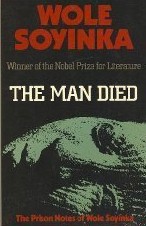
“The Man Died” is a memoir written by Wole Soyinka, a playwright, poet, and author, and Nobel laureate. The book provides a first-hand account of Soyinka’s experience during his imprisonment in Nigeria, following his arrest in 1967 during the Biafran War. The book is divided into three parts, with each part covering a specific period of time during Soyinka’s incarceration.
Part One of the book begins with Soyinka’s arrest and detention in 1967. At the time of his arrest, Soyinka was teaching at the University of Ibadan, and had been accused of supporting the secessionist movement in Biafra. Soyinka describes the dehumanizing conditions of his imprisonment, which included being subjected to various forms of physical and psychological torture. Despite these challenges, Soyinka remained determined to resist his captors and maintain his dignity.
Part Two of the book covers Soyinka’s transfer to a maximum-security prison in Lagos in 1969. During this period, Soyinka was kept in solitary confinement, and was denied access to books, writing materials, and other basic amenities. Despite the harsh conditions, Soyinka continued to resist his captors and to maintain his sanity through a variety of intellectual pursuits, including meditation, memorization of poetry, and the creation of mental exercises.
Part Three of the book covers Soyinka’s eventual release from prison in 1969, and his subsequent efforts to document his experiences and to promote human rights in Nigeria. Soyinka reflects on the importance of speaking truth to power, and on the role of artists and intellectuals in the struggle for social justice.
Overall, “The Man Died” is a powerful and moving memoir that offers a searing indictment of authoritarianism and a tribute to the resilience of the human spirit. Soyinka’s prose is lyrical and evocative, and his insights into the nature of power and oppression are both incisive and poignant. Through his personal story, Soyinka reminds us of the importance of standing up for what is right, even in the face of overwhelming odds, and of the enduring power of hope and resilience in the face of adversity.
